- Kenmore refrigerator water filters
- Whirlpool refrigerator water filters
- Samsung refrigerator water filters
- GE refrigerator water filters
- LG refrigerator water filters
- Frigidaire refrigerator water filters
- KitchenAid refrigerator water filters
- Maytag refrigerator water filters
- Kenmore Elite refrigerator water filters
- Estate refrigerator water filters
- GE Profile refrigerator water filters
- Amana refrigerator water filters
- Bosch refrigerator water filters
- Dacor refrigerator water filters
- Electrolux refrigerator water filters
How to replace a defrost sensor in a side-by-side refrigerator
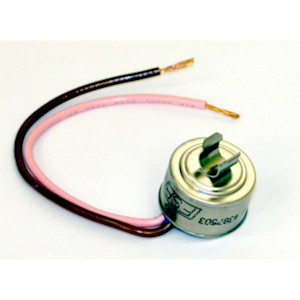
This refrigerator repair guide gives step-by-step instructions for replacing the defrost sensor in a side-by-side refrigerator. The defrost sensor—also called a defrost bi-metal thermostat—shuts off the defrost heater if the heater gets hot enough to damage the evaporator.
If the refrigerator defrost sensor fails:
The heating element doesn't turn on.
Frost builds up on the evaporator and clogs air passages through the evaporator.
Cooling air fails to reach the refrigerator compartment resulting in warm temperatures in the refrigerator.
If your refrigerator defrost sensor isn't allowing the defrost heater to turn on, replace the defrost sensor with the manufacturer-approved replacement part.
Use this repair procedure on Kenmore, Whirlpool, KitchenAid, Maytag, Amana, GE, Frigidaire, Electrolux, Bosch and Samsung side-by-side refrigerators.
Quick links
Instructions
Tools required
1/4-inch nut driver
Screwdriver
Work gloves
Wire stripper
Repair difficulty
Time required
45 minutes or less
Repair difficulty
Time required
45 minutes or less
Instructions
- 01.
Disconnect the electrical power
Safely store any food that could deteriorate while the refrigerator is shut off. Then unplug the refrigerator or shut off the circuit breaker for the refrigerator.
- 02.
Remove shelf supports from the freezer
Remove the shelves and baskets from the freezer compartment. Remove the screws from the shelf supports on the right interior wall of the freezer and pull the supports out.
Tip: If necessary, refer to your owner's manual for guidance in removing baskets and shelves from the freezer.
PHOTO: Remove the freezer basket.
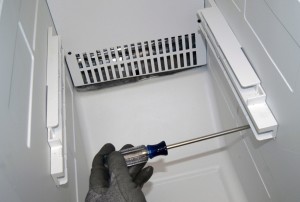
PHOTO: Remove the freezer shelf supports.
- 03.
Remove the back panel
Remove the mounting screws that secure the inside back panel of the freezer. Pull the bottom of the panel outward slightly to release it.
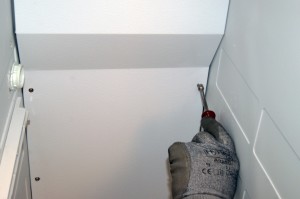
PHOTO: Remove the evaporator panel screws.
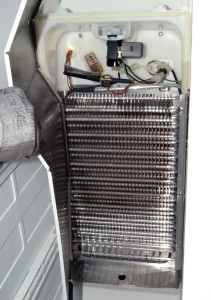
PHOTO: Remove the evaporator panel.
- 04.
Unclamp the defrost sensor from the evaporator
Note the positioning of the defrost sensor. Release the metal clip that holds the defrost sensor to the refrigerant line located above the evaporator.
Tip: Take a digital photo of the defrost sensor to help you position the replacement correctly.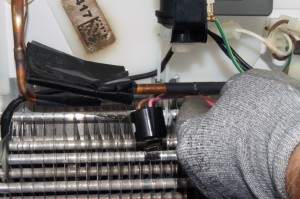
PHOTO: Release the defrost sensor clip.
- 05.
Remove the defrost sensor
Cut the brown and pink wires near the defrost sensor and pull the defrost sensor out of the freezer.
- 06.
Install the new defrost sensor
Use a wire stripper to remove the insulation from the ends of the pink wire and brown wire on the new sensor. Strip the ends of the pink wire and brown wire in the harness above the evaporator. Use wire nuts to connect the matching wires.
To keep the connection dry, squeeze silicone sealant into the open ends of the wire nuts.
- 07.
Clip the defrost sensor onto the refrigerant line
Clip the new defrost sensor onto the refrigerant line above the evaporator. Position it in the same manner as the original defrost sensor.
Without disturbing the sealant on the wire nuts, push the wires above the evaporator. Use a cable tie to fasten the wires to other wires in the harness to keep them out of the way.
- 08.
Reinstall the back panel
Reinstall the back panel and replace the mounting screws. Over tightening the screws can crack the freezer liner or the mounting rails. Rotate the screws until they stop and then snug them up with a final twist. Reinstall the baskets and shelves.
- 09.
Restore electrical power
Plug in the refrigerator or turn on the house circuit breaker to restore power.
Warning: Undertaking repairs to appliances can be hazardous. Use the proper tools and safety equipment noted in the guide and follow all instructions. Do not proceed until you are confident that you understand all of the steps and are capable of completing the repair. Some repairs should only be performed by a qualified technician.
Most common symptoms to help you fix your refrigerators
Choose a symptom to see related refrigerator repairs.
Main causes: blocked vents, defrost system problems, evaporator fan failure, dirty condenser coils, bad sensors, condens…
Main causes: damaged door seal, faulty defrost sensor or bi-metal thermostat, broken defrost heater, bad defrost timer o…
Main causes: jammed ice cubes, broken ice maker assembly, dirty water filter, kinked water line, bad water valve, freeze…
Main causes: control board or cold control failure, broken compressor start relay, compressor motor failure, defrost tim…
Main causes: leaky door gasket, defrost system failure, evaporator fan not running, dirty condenser coils, condenser fan…
Main causes: blocked air vents, compressor problems, condenser or evaporator fan not working, control system failure, se…
Main causes: water valve leaking, frozen or broken defrost drain tube, overflowing drain pan, cracked water system tubin…
Things to do: clean condenser coils, replace the water filter, clean the interior, adjust doors to prevent air leaks, cl…
Most common repair guides to help fix your refrigerators
These step-by-step repair guides will help you safely fix what’s broken on your refrigerator.
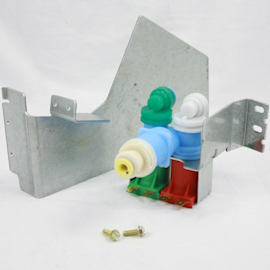
How to replace a refrigerator water valve
Replace the water valve that feeds water to the ice maker and water dispenser if it no longer controls the flow of water…
Repair difficulty
Time required
15 minutes or less

How to clean refrigerator condenser coils
Help your refrigerator run more efficiently by cleaning the condenser coils. It's easy and takes just a few minutes.…
Repair difficulty
Time required
15 minutes or less
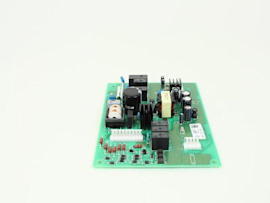
How to replace a refrigerator temperature control board
If the temperature in your refrigerator doesn't match the temperature you set, the problem could be the temperature cont…
Repair difficulty
Time required
30 minutes or less
Effective articles & videos to help repair your refrigerators
Use the advice and tips in these articles and videos to get the most out of your refrigerator.
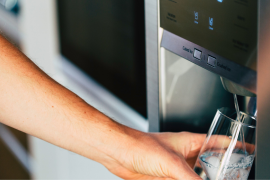
No matter what style Maytag refrigerator you have, we can walk you through replacing the water filter.…

Learn about all the convenient features on our Sears PartsDirect website that make your parts purchases easier.…
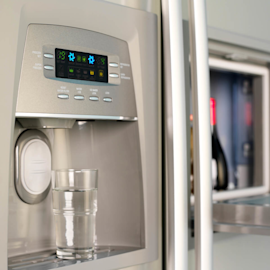
If your refrigerator's ice maker isn't producing as much ice as it should, or water is flowing poorly from the dispenser…
